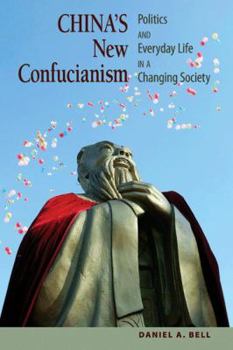China's New Confucianism: Politics and Everyday Life in a Changing Society (New in Paper)
Select Format
Select Condition 
Book Overview
What is it like to be a Westerner teaching political philosophy in an officially Marxist state? Why do Chinese sex workers sing karaoke with their customers? And why do some Communist Party cadres get promoted if they care for their elderly parents? In this entertaining and illuminating book, one of the few Westerners to teach at a Chinese university draws on his personal experiences to paint an unexpected portrait of a society undergoing faster...
Format:Paperback
Language:English
ISBN:0691145857
ISBN13:9780691145853
Release Date:May 2010
Publisher:Princeton University Press
Length:280 Pages
Weight:0.90 lbs.
Dimensions:0.7" x 6.0" x 9.1"
Customer Reviews
3 ratings
Highly recommended
Published by Thriftbooks.com User , 15 years ago
Oxford-University educated political philosopher Daniel Bell is-- as the reviewer above me mentioned-- one of the foremost authorities working on contemporary Chinese political philosophy today. He is also very uniquely situated as the first Western scholar to teach on a longterm basis in the department of philosophy at China's top university (Tsinghua University). In addition to Tsinghua, Bell has also taught at universities in Hong Kong and Singapore and is an extremely prolific writer-- writing for both an academic as well as a general audience. Perhaps of greatest significance to me is that he is trilingual and fluent in Chinese. With his impressive background in mind, I was expecting a lot from his work-- and I was not disappointed. I will echo that this particular book of Bell's would be of great interest to anyone wanting to read more about contemporary Chinese society or politics. However, what I have found most stimulating about his work is his ability-- and indeed his courage--to engage with the underlying philosophies that inform the issues. So often, when we read books about foreign-born philosophies (not just Confucianism, but Buddhist philosophy, daoism etc.) it seems that the authors feel compelled to present the philosophies only in such a way that maps on to our modern sensibilities. Of course, there is interest in seeing how, for example, Confucianism can be mapped on to American neo-liberal ideals, etc. That is fine. But, I think the lesser-traveled but more interesting and intellectually-stimulating route is to engage in the ideas (and their logical implications) as much as possible without filtering them through Western sensibilities. I mean, what in the end can we learn or take away from a Westernized view of Confucianism? I think this is precisely why Bell remains a somewhat controversial figure (online he remains my favorite cause célèbre on various China-related blogs!) precisely because he takes people out of their comfort zones (for example his chapter on karaoke). The man thinks outside the box. And for that reason alone, I highly recommend this book (especially for readers who sincerely want to engage with ideas which might make them uncomfortable). Along these lines-- and similar to Parag Khanna's work-- Bell presents alternative models for developing countries. And, I would recommend reading his ideas regarding contemporary Chinese politics with democratic India and the Philippines in mind (for example). Like the reviewer at the top, in one sense I also found the work Beijing-centric. On the other hand, though, I also found his book to be surprisingly relevant to Japanese contemporary sensibilities. Japan and Korea are often cited as the great Confucian societies today. I have lived in Japan myself for 20 years and Bell's book was surprisingly relevant to my experiences in Japan (I won't speak about Korea as I have not spent enough time there)--this was particularly so in his chapter "Hierarchical Rituals an
Original and thought-provoking
Published by Thriftbooks.com User , 15 years ago
Recommended for anyone who wants to learn about society and politics in China. The author anticipated civility and Confucianism in the Olympics. If he's right about the revival of Confucianism in politics, the book will be seen as groundbreaking. If not, it is still an original and thought-provoking account of how Confucianism shapes social life in China. And it's a humane and progressive form of Confucianism: "left-Confucianism", as the author puts it. The chapter on sex, singing, and civility is both shocking and plausible. My one qualm is the book seems a bit too "Beijing-centric", the social and political scene may not look so "Confucian" outside the capital city.
Confucianism: the soul of China
Published by Thriftbooks.com User , 16 years ago
Professor Daniel Bell happens to be one of the two most serious authorities to write about Chinese society, politics, and its culture. The other writer being Mr. Edgar Snow. Professor Bell writes in a comprehensive and detailed manner various prevalent social and cultural practices of the Chinese people and the underlying philosophy guiding their psyche. The Middle Kingdom has always been an enigma. China turned inward because of constant foreign invasions and it is little wonder that Confucianism and Taoism would be their soul's activities. Henry Kissinger has written that China is well content with its inward philosophies. In the section dealing with China, my book 'Tracing the Eagle's Orbit' throws a lively insight into the Chinese psyche. Professor Bell, the author of so many good books is well placed to write on China and his stupendous efforts even at this age must be a model for every writer and politician. I strongly recommend this book to those who want to know the reality within contemporary China. Gautam Maitra Author of Tracing the Eagle's Orbit: Illuminating Insights into Major US Foreign Policies since Independence'.





